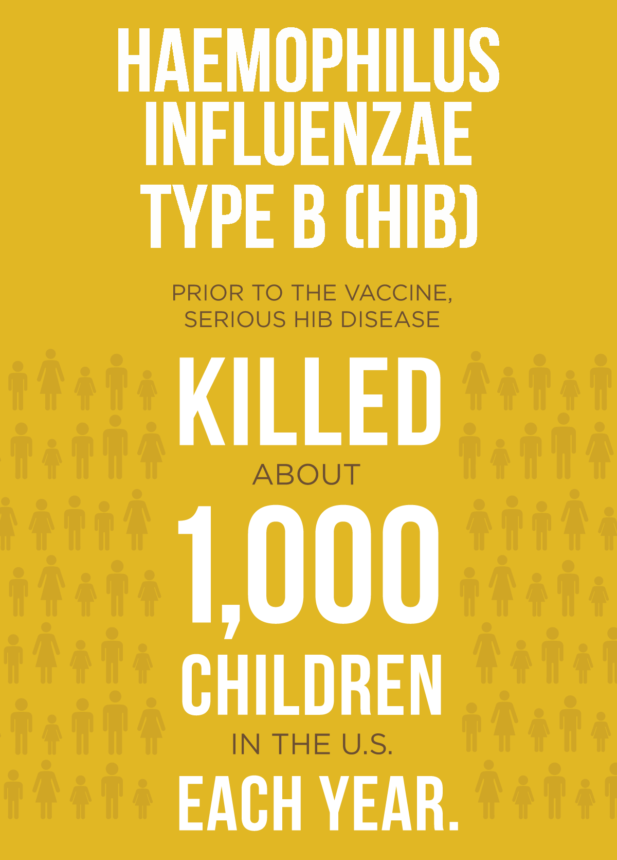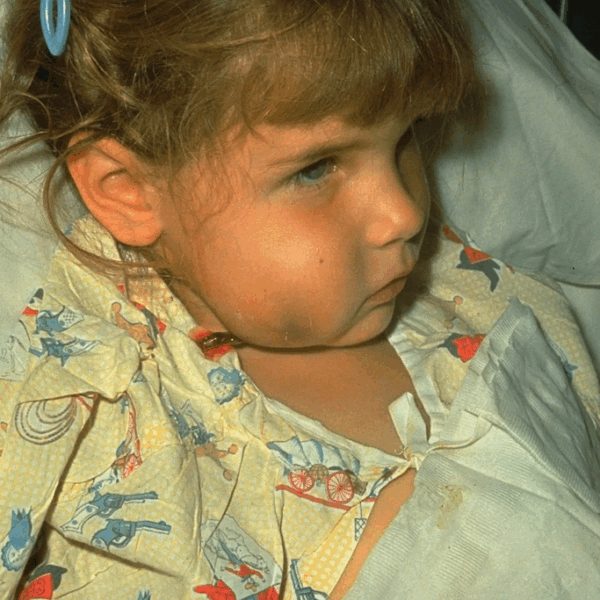Haemophilus influenzae type b (Hib)
What is Hib?
Haemophilus influenzae type b (Hib) is a very serious bacterial illness, especially for children under five years old. Even with good medical care, as many as 1 in 20 kids who get sick with Hib meningitis will die from it, and up to 1 in 5 who survive will have permanent hearing loss or other lasting problems like brain damage.
Hib disease primarily affects children under five, and adults 65 and older. Children under one year old have the highest rates of infection.
For the best protection against Hib, all children under 5 years old should receive all recommended doses of the Hib vaccine.
On this page, you can explore how Hib spreads, who is at risk, what the symptoms are, whether Hib can lead to serious disease, and how to prevent Hib.
Even with proper medical care, as many as 1 in 20 kids who get sick with Hib meningitis will die from it.
How does this disease spread?
Hib spreads when an infected person coughs or sneezes. The Hib bacteria primarily live in a person’s nose and throat and often do not cause illness. However, if the bacteria spread to the lungs or bloodstream, they can lead to serious illness.
If a mother is immune to Hib through vaccination or prior infection, she may pass some antibodies to her infant before birth. These antibodies do not last long, so it’s important to get the child vaccinated according to the recommended immunization schedule. However, a newborn can be infected at birth if they inhale infected amniotic fluid or come into contact with genital tract secretions containing the bacteria.

Several factors can increase the risk of serious disease:
1. Age: Children under 5, especially those younger than 1, and adults 65 and older are at higher risk. Infants have the highest infection rates.
2. Race and Ethnicity: Children of certain racial and ethnic groups, including African American or Black, Alaska Native, and American Indian children, experience higher rates of serious Hib disease.
3. Vaccination Status: Children who have not received all their Hib vaccines or are too young to be vaccinated are at greater risk for Hib disease.
4. Close Contact: People who live with or attend daycare with someone who has Hib disease may be at increased risk of infection.
5. Medical Conditions: Certain health conditions increase vulnerability, such as:
- Sickle cell disease
- Asplenia (lack of spleen)
- HIV infection
- Weakened immune system
- Cancer requiring treatment with chemotherapy, radiation, or bone marrow stem cell transplants
- Antibody or complement deficiency syndromes (rare immune disorders that affect the body’s ability to fight infection)
Symptomless people can spread Hib through the air via coughs or sneezes, releasing respiratory droplets that others may breathe in or come into direct contact with.
What are the symptoms of Hib?
Hib causes a variety of symptoms depending on the part of the body that’s affected:
Mild symptoms:
- Ear infection: Pain, redness, swollen eardrum, fever, and sleepiness
- Bronchitis: Cough with or without mucus, chest soreness, excessive tiredness, mild headache, mild body aches, and sore throat
Symptoms of a serious infection:
- Meningitis: Sudden onset of fever, headache, confusion, stiff neck, nausea, and sensitivity to light
- Meningitis in babies: Poor feeding, vomiting, abnormal reflexes, appearing slow or inactive, and irritability
- Pneumonia: Fever and chills/sweating, headache, cough, shortness of breath or difficulty breathing, muscle aches/pain, excessive tiredness, and chest pain
- Bloodstream infection: Fever and chills or sweating, extreme fatigue, pain in the stomach, diarrhea/nausea, anxiety, shortness of breath or difficulty breathing, and confusion
- Epiglottitis: Difficulty breathing, high-pitched sound when breathing, fever, restlessness, irritability, sore throat, and drowsiness


Can Hib infection lead to serious disease?
Hib can cause both mild and serious illness. While it is a common cause of ear infections in children and bronchitis (chest cold) in adults, it can also lead to more severe conditions. The most serious forms of Hib disease include:
- meningitis (infection of the membranes surrounding the brain and spinal cord)
- pneumonia (lung infection)
- bloodstream infection (bacteremia)
- skin infection (cellulitis)
- septic arthritis (joint infection)
- epiglottitis (life-threatening swelling and inflammation of the epiglottis, which can block the airway)
Between 3% and 6% of Hib cases in children are fatal. Additionally, up to 20% of those who survive Hib-induced meningitis experience permanent hearing loss or other long-term neurological consequences.
Hib infections can result in sepsis, long-term complications, and death.
How can I prevent Hib?


Babies and Children
For the best protection against Hib, all children under 5 years old should receive all recommended doses of the Hib vaccine (the number of doses depends on the vaccine brand). The schedule is:
- 2 months
- 4 months
- 6 months (if needed, depending on the vaccine brand)
- 12 through 15 months
The AAP also recommends that unvaccinated older children with certain medical conditions, as well as individuals who have received a bone marrow stem cell transplant, get the Hib vaccine. Be sure to talk to your healthcare provider about the best vaccination plan for your child’s specific needs.


Adults
The AAFP recommends Hib vaccine for unvaccinated adults with certain risk factors. Talk to your healthcare provider about what is best for your specific situation.
Immunization Schedules
To ensure that your family is up to date on their vaccines, view or download the childhood and adult immunization schedules and talk to your healthcare provider.


